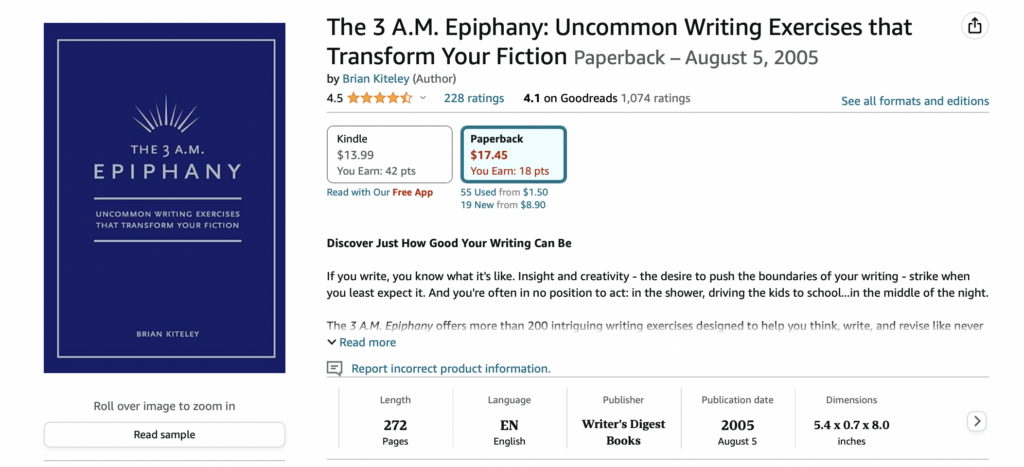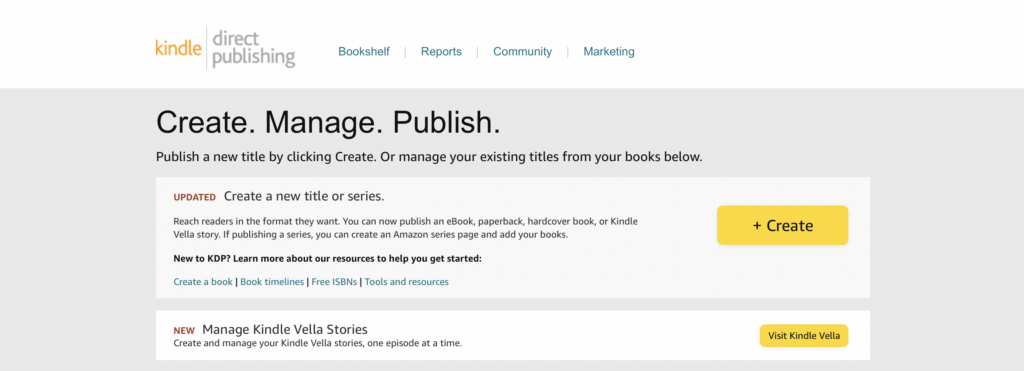[ad_1]
Having your name on the cover of a book is a dream come true for most people. They want the increase in authority that being an author grants them, but they don’t know where or how to start writing. This is particularly true if you have little to no experience writing or formatting your thoughts into words. You need to know how to write a book with no experience, moving from concept to completion.
If you are ready to do some of your own writing and put your skills to good use, here are 11 easy steps you can follow to make the writing process move smoother.
Familiarize Yourself with the Writing Process

Before you can start writing, take some time to familiarize yourself with the writing process.
This might mean researching different outlining techniques (more on this soon) or learning how to walk through every step of the publishing process.
Preparation can help your first draft move along more quickly and easily with less time in the editing stages.
Research is the most important thing to you at this stage of the process.
No matter what your question may be, you can learn how to write a book with no experience simply by dedicating a few hours to learning more about the world of traditional publishing and self-publishing.
It sets you up for increased success as a writer when you understand the ins and outs of a writing process.
Choose a Profitable Topic

How much money can you make by embracing a writing journey? Well, it really depends on how many people want to buy your book.
Choosing a profitable topic and book idea allows you to write a book specifically for the market.
Tools like KDSPY can help you find profitable niches and keywords that appeal to your desired target audience. KDSPY allows you to research what your competitors are doing and what keywords are really moving books right now. It even helps you estimate revenue for your new titles.
For more information on whether this tool is right for you, check out our KDSPY review here.
Hone Your Writing Skills (Books and Exercises)

Maybe you want to know how to write a book with no experience but feel overwhelmed by all of the things that you need to learn and do to be a successful writer.
It all starts with something simple: honing your writing skills and flexing that creative muscle.
Invest in a few quality books of writing prompts to give you an endless number of ideas for where you can take your next project. You never know — you might even write a book based on one of these prompts!
Here are some of my favorite writing prompt books that teach technique and get you thinking:
Before you write a book, you might want to start with a short story. Use some of these writing prompts to kickstart your ideas and help you move forward.
Outline Your Book Before You Start Writing

Maybe you feel prepared to start writing now that you have some ideas flowing, a little bit of character development going on, and a story structure in place.
I’m not sure if there ever is such a thing as being totally and completely ready to write a book. However, you can go far if you do some planning before you sit down to start the book. In other words, you should plan and outline your new book idea.
Here are two methods that you can use for novel writing, short stories, or even non-fiction writing.
Pixar Method of Storytelling
Pixar is arguably one of the most well-known storytellers in the world. They have a simple structure for how their stories are formatted that all writers can benefit from.
If you’ll be writing a book of fiction, then you’ll want to try out this method. It looks something like this:
- Once upon a time…
- Every day…
- One day…
- Because of that…
- Because of that… (repeat until you get to the next step.)
- Until finally…
Fill out all of the sentences with the details of your story idea. This helps you frame the beginning of the story and marry the plot and purpose together, avoiding major plot holes in your story. This is just a way to think about story structure with a fresh perspective.
Outlining Non-Fiction Writing
Things are a little different if you want to write a non-fiction book instead of science fiction, fantasy, or another fiction genre. You can try a different type of writing exercise to learn how to write a book with no experience in this genre.
Think about these aspects of your book as you plan:
- Title and subtitle: It should be clear what your book is about and how it will help readers engage with the text.
- Format: Understand how you want to structure the book, whether that is by short chapters, sections, interviews, or some other creative format.
- One sentence synopsis: Write a single sentence that captures what each chapter or section will be about.
- Connection to the reader: Write a sentence or two about the changes that will take place in the reader from the time they start your book to the time they close the book.
Start Writing a First Draft

With a little planning accomplished, it’s time to start writing your first draft. The writing process may feel challenging when you’re working on a first draft, but this will hopefully fade for you with time.
Set aside a specific amount of time to write each day so that you are guaranteed to get some work done.
If you write a page a day, you will have a 365-page book at the end of the year. Writing just this much a day is an achievable goal as you hone your writing skills.
Keep in mind that a first draft is meant to be sloppy and unrefined. At this point, the goal is not to polish your prose but to simply get the words on the page. If you go over each word with a fine-toothed comb right now, you will never finish writing the book.
Make progress and watch the pages stack up. Editing comes later.
Seek Out Community for the Writing Journey

The writing process is slow-going, and it can even feel quite lonely at times. After all, the process of writing forces you to sit by yourself and work with nothing but your own thoughts and feelings.
No matter what type of writing you do (fiction or non-fiction), everyone can benefit from having friends alongside them.
A writing community or a writing group can give you crucial feedback that you need to improve your manuscript. It provides a safe container for you to practice writing and see what areas you might need to shore up.
They may even be able to offer you resources to learn new skills.
Of course, choosing a group that fits your writing style is the best way to become a better writer. Don’t sign up for a group that has all non-fiction authors if you’re writing fiction.
You might even want to find a group that specializes in your genre. For example, everyone might be working on a romance novel or a science fiction book.

Maybe you worry that you aren’t a good writer, or you struggle to stay focused on writing a book that your audience would love to read.
If you find yourself stressed by how many words you need to write, and it hinders you from doing any actual writing, it might be time to call in the reinforcements.
AI tools are making it easier than ever before to write an entire book. They can help you create compelling characters, develop plots, and get a first draft done as soon as possible with minimal hands-on time for you.
Jasper is one of the top tools if you want to start writing but have trouble getting started. You can use it as a jumping-off point by having it write an introduction to each chapter or allow it to write the book on its own.
With the right guidance, it can also help with character development. It can be modified by tweaking the inputs that you give the tool.
However, you will need to have some of the work done before Jasper can do the heavy lifting. An outline will help you guide the tool and shape what it gives you until you get something that matches your expectations.
For more guidance on how to use Jasper, see our complete Jasper review here.
Edit the Entire Book

Hopefully, the book will flow from your fingertips with ease once you start writing. Once the draft is done, you start to really think about what it needs in order to be in publishable shape.
Especially if you are trying to learn how to write a book with no experience, you might want to consider hiring a professional editor to give it a once-over.
There are multiple kinds of editors, so decide what might suit you best:
- Developmental editors: These editors look for plot holes and story structure. They look at the bigger picture of your book to make sure everything hangs together.
- Copy editors: This type of editor looks for grammar and syntax issues so that your sentences don’t draw too much attention to themselves.
- Proofreaders: Proofreaders look for small errors like typos.
Of course, you can also hire a writing coach to help you along the path to publishing.
A writing coach is someone who can help hold you accountable for putting words on the page. They might also serve as a sort of first-line developmental editor.
Oftentimes, they can pinpoint problems with your story before it gets too far along.
Put Your Book into the World with Self-Publishing

The fastest and easiest way to get your book into the hands of readers is through self-publishing. Particularly if you are interested in how to write a book with no experience, this is the easiest way to make it past the gatekeepers of a traditional publishing company.
Traditional publishing involves submitting your story to an agent who sells it to an editor who brings it to completion. Self-publishing allows you to cut out the middleman and keep more royalties in your pocket.
Amazon’s Kindle Direct Publishing allows you to upload your manuscript and publish it as an ebook, paperback book, or hardcover book without investing thousands of dollars.
They take a cut for the print-on-demand service, but it is a hands-off way for you to manage your overall book sales.
The downside to publishing this way is that you may not have the same valuable insights that you would receive from an in-house editor.
If you have no prior experience, this can mean the difference between writing a book that people will love to read and one that falls flat.
Final Thoughts: How to Write a Book with No Experience
Are you ready to dive into how to write a book with no experience? The most important thing you can do to move the needle forward on your dreams of becoming a published author is simply to start writing as soon as possible.
Spend some time learning about the craft of writing, researching the topics that are selling in today’s marketplace, and outlining your book idea.
With some of these frameworks in place, you’ll be able to write a book you can be proud of!
For more information on how to write a book, see some of our other guides here:
[ad_2]




